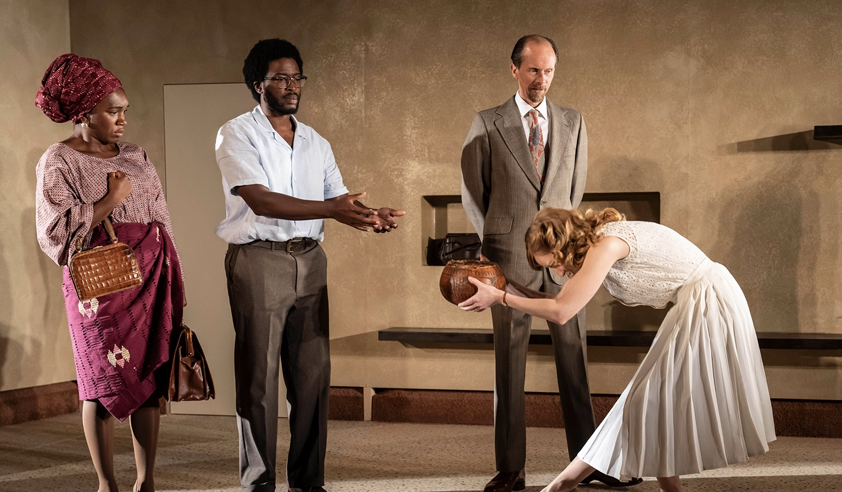‘Beneatha’s Place’ Review: A timely deep-dive into the ownership of the black experience

Kwame Kwei-Armah’s play, ‘Beneatha’s Place,’ spans from the 1950s to the present day, following a black couple who move from the US to Lagos amidst the struggle for Nigerian independence. The couple relocated with hopes of escaping the pains of prejudice. Despite being predominantly set in Lagos with a black protagonist, it would be naive to perceive this play as a mere celebration of black power and the black experience. Kwei-Armah’s play sharply challenges the belief that black people have made significant progress from the 1950s to now. Between the 70 years that the play covers, there is one running constant: the haunt of white dominance.
The prologue begins with Beneatha’s rousing speech about setting up a school of Black Studies. This speech quickly turns into a protest as the scene is overwhelmed with sirens, screaming, and tear gas. The sense of black power is strong yet short. As the couple relocates to Lagos, Kwei-Armah reminds the audience of white ubiquity. When the couple arrives, their new neighborhood is white and filled with people that think ‘Nigeria’ and ‘Africa’ are synonymous. This play provides a rather blunt suggestion that even amidst Nigerian independence, black people can be strangers within their own homes.

Kwei-Armah’s second act is starkly different, yet the sentiment remains the same. The act is set in the 2020s, and Beneatha is in her 70s. She has returned to her house in Nigeria along with some white colleagues discussing whether African American Studies should be replaced by ‘Critical Whiteness Studies.’ The fact they are talking about black intellectualism is merely an illusion, as the discussion is just centered around whiteness. The director of African Studies is a white man with a savior complex and Jesus sandals to match. He and his other white colleagues speak about the black experience with an unjustified familiarity. Kwei-Armah provides a timely admonition to us all here: the shadows of colonialism still speak. In 1950s Nigeria, black people did not own their land; in the 2020s, black people did not own their own intellectual thought.
The message is disappointingly realistic, but the ending is even more so. The last few moments see Beneatha succumb to what her white colleagues want, and so she votes to change African American Studies to Critical Whiteness Studies. The ending is puzzling – whether this is a moment of pragmatism or weakness. Nonetheless, there seems to be a rather haunting message that conformity is inevitable.
Check out ‘Beneatha’s Place’ at the Young Vic, London, until August 5th 2023.
Discover more Arts and Culture articles here.




![ZINO VINCI’S ‘FILTHY & DISGUSTING’EP BRINGS YOU TO THE CORE OF THE ARTIST [@ZinoVinci]](https://guap.co/wp-content/uploads/2023/10/Zino-4.jpg)





![Remel London’s [@Remel_London] “Mainstream” is a must attend for upcoming presenters!](https://guap.co/wp-content/uploads/2017/02/REMEL-LONDON-FLYER-FINAL-YELLOW-COMPLETE-1.png)